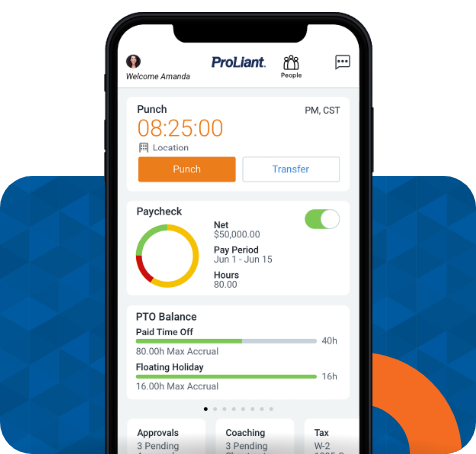As we move into 2022, we have a lot of adjustments to make, including keeping up with new Department of Labor laws, shifting policies, increased minimum wages, and other regulations. This blog post summarizes six changes that we believe will affect internal policies and how we manage employees in 2022.
1. Employee-Friendly NLRB
According to the National Law Review, the National Labor Relations Board (NLRB) under the Biden administration is poised to be more employee-friendly than that of the last administration. This means more strict enforcement of employee rights under the NLRA and possibly a change to federal policies and practices that would empower workers who wish to organize and bargain with employers.
This renewed focus on the rights of employees means that employers will need to take a close look at their practices and ensure they are compliant with the National Labor Relations Act. An article from Akerman law firm suggests that employers take steps to “mitigate the risk of appearing before the NLRB.”
2. Employment Discrimination Legislation
The National Law Review mentions that the Senate is currently waiting to vote on the Pregnant Workers Fairness Act (PWFA). There is a “renewed interest in combating discrimination at the state and municipal level.” The PWFA seeks to enhance protections for pregnant workers and make it “unlawful for employers to deny a pregnant person a reasonable accommodation.”
New state legislation focusing on discrimination includes states like California taking on settlement and non-disparagement agreements and Illinois making it unlawful to discriminate against employees for associating with a disabled person.
Employers should review their policies and ensure that they are compliant with new local and federal discrimination legislation and turn their attention to bolstering diversity and inclusion efforts. In addition to policy updates, many companies have had to make tough decisions regarding changes in management.
3. Vaccine and Testing Mandates
There has been a lot of back and forth regarding vaccine and testing mandates in the past few months. Recently, the Supreme Court has stopped the rule for U.S. businesses that would require employees at large businesses to be vaccinated against COVID-19 or undergo weekly testing. However, the court will allow the vaccine mandate for most health care workers to proceed. This mandate may affect around 76,000 health care facilities and home health care providers while still allowing for medical and religious exemptions.
According to SHRM, the pandemic will still have an effect on legal trends and policies, and some employers may require workers to get booster shots or postpone plans to return to work as the rise of variants like omicron continues to threaten the efficacy of initial vaccinations. It will be vital for employers to keep up with local and federal legislation surrounding requirements for vaccinations and the limitations on what they can ask of their employees.
4. Revision of the Department of Labor’s Overtime Rule
In 2022, the DOL will likely revisit the salary threshold for workers classified as nonexempt from overtime requirements. There are those advocating for minimum salary changes, increasing the threshold as high as $85,000 per year or revisiting the proposed threshold increase of $47,476 that was struck down in 2017. According to SHRM, states and municipalities are adjusting salary thresholds for overtime, so it will be essential for employers to keep an eye on new requirements.
5. Minimum Wage Increases
In addition to salary changes for exemptions, minimum wages have increased in many states at the start of 2022. Most affected businesses have already implemented the new pay rates. However, it would still be prudent for employers to confirm with HR that the changes for state and local minimum wages have been made and that they are in compliance.
State Minimum Wage Increases in 2022
Arizona — $12.80
California — $14 per hour for employers with fewer than 25 employees
Colorado — $12.56
Delaware — $10.50
Illinois — $12.00
Maine — $12.75
Maryland — $12.20 (14 or fewer); $12.50 (15+ employees)
Massachusetts — $14.25
Michigan — $9.87 (unless the state’s unemployment rate for 2021 exceeded 8.5%, in which case the current $9.65 rate will remain in effect for 2022)
Minnesota — $10.33 for large employers; $8.42 for small employers
Missouri — $11.15
New Jersey — $13.00 for most employers; $11.90 for small employers (fewer than 6 employees)
New Mexico — $11.50
New York — $13.20
Ohio — $9.30 (for employers with annual gross receipts of $342k per year; otherwise, the federal minimum wage applies)
Puerto Rico — $8.50
Rhode Island — $12.25
South Dakota — $9.95
Vermont — $12.55
Virginia — $11.00
Washington — $14.49
6. New Requirements for Federal Contractors
The U.S. Department of Labor announced a final rule to increase the hourly minimum wage for employees on federal contracts to $15.00 beginning January 30th, 2022. This rule applies in all U.S. states and specified territories.
In addition to an increase to the hourly minimum wage for workers performing work on or in connection with covered federal contracts, the rule also:
- eliminates the tipped minimum wage for federal contract employees by 2024
- ensures a $15 minimum wage for workers with disabilities performing work on or in connection with covered contracts
- restores minimum wage protections to outfitters and guides working on federal lands
- continues to index the federal contractor minimum wage in future years to inflation
Stay compliant with Proliant
At Proliant, our payroll and HR experts stay up to date on labor laws and changing regulations to ensure that we can help our clients remain compliant. The changes at the beginning of 2022 portend a new year full of many challenges, and we are here to make managing HR and payroll easy as we face them together.
To learn more about Proliant’s solutions and our perfect combination of technology and service, contact us today.




No Comments Yet
Let us know what you think